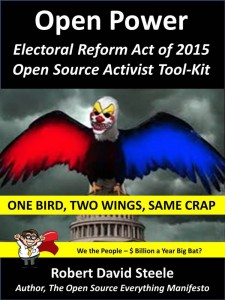
Robert David Steele
![]() Last Exit to Democracy, February 26, 2015
Last Exit to Democracy, February 26, 2015

Robert David Steele
![]() Last Exit to Democracy, February 26, 2015
Last Exit to Democracy, February 26, 2015
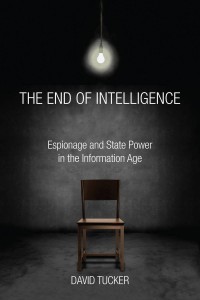
David Tucker
3.0 out of 5 stars A poor thesis, rotten sources, with no quality control in the literature review, January 27, 2015
This is a hugely disappointing book. It reads like a graduate thesis badly overseen (with zero in the way of serious literature search). While the author has some experience in the foreign service (perhaps in the clandestine service) and as an action officer and minor manager in the Pentagon bureaucracy responsible for Special Operations and Low Intensity Conflict, he knows little about intelligence in all its complexity, less about the information revolution, and nothing at all across 80% of the relevant literatures he fails to discover or cite.
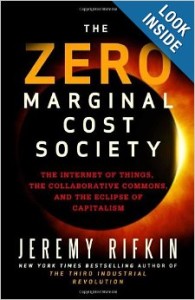
Jeremy Rifkin
3.0 out of 5 stars Never Mind the Total Cost Terminal Society, April 13, 2014
Books like this would make me crazy if I took them seriously. This is a fad book for shallow minds that have no clue about holistic analytics, true cost economics, or anything remotely resembling the humanities (which is to say, the preservation of the good from one generation to the next). This book is the singularity cult on crack. Buy the book, by all means, to understand how seriously stupid is now in vogue.
There are some clever (which is to say, fad of the day) observations in this book but they vary from wrong (MOOCs have a 4% completion rate and are absolutely useless to 90% or more of the five billion poor who do not have the time to do MOOCs) to incomplete — who crowd sources against corruption and waste? Part of the answer is in this book, but no more than 20%. I've raised the book from one to three stars on a second pass, but I am still irritated.
The one place where Rifkin and I are 100% in harmony is on free energy…but he pulls his punches. Free energy is here now but the “system” is intent on keeping energy expensive and the 99% in rentier status. To truly understand the alternative energies now in hand, there is no book available, but if you search for Sepp Hasslberger @ Phi Beta Iota you will be on the bleeding edge of intelligence with integrity on this one topic that is so vital to all of us.
Marginal Cost is the cost at scale after all the FIXED COSTS (little things like water, fuel, child labor, tax avoidance, imposed disease) have been “accounted for.” The problem with Rifkin's book, which would be a great riff at a late night show where everyone is smashed beyond cognition, is that it discounts reality by 99%. This book is the epitome of what Dr. Russell Ackoff would call “doing the wrong things righter instead of the right thing.

Jeremy Rifkin
3.0 out of 5 stars BOOK REVIEW: ‘The Zero Marginal Cost Society': Welcome to the Brave New Workerless World, April 1, 2014
ByDavid Kinchen – See all my reviews
(REAL NAME)
“The Capitalists will sell us the rope with which we will hang them.” –Vladimir Ilyich Lenin (1870-1924) First Leader of the Soviet Union
Marginal cost is the term used in the science of economics and business to refer to the increase in total production costs resulting from producing one additional unit of the item. Zero marginal cost describes a situation where an additional unit can be produced without any increase in the total cost of production. Producing another unit of a good can have zero marginal costs when that good is non-rivalrous, meaning that it is possible for one person to consume the good without diminishing the ability of others to simultaneously consume it as well. –Wise Geek.com
Continue reading “Review (Guest): The Zero Marginal Cost Society”
3.0 out of 5 stars Rooted in State Paradigm, Ignores Non-State World, January 5, 2014
I made a mistake buying this book. I let the marketing hype get to me. As soon as I got the book in my hands and saw that it had jacket blubs from Fareed Zakaria and Larry Summers, the sinking feeling in my stomach was plapable.
I've gone through the book, which is double-spaced without a single chart or map or table. This is a long essay by someone who is out of touch with the latest thinking, still in the nation-state / banks rule the world mode.
For someone that reads very broadly, as I do, virtually every page in this book is irritating. The author's treatment of water, something I looked into for UNESCO (see my easily found review of fourteen books on water and water wars, < Water: Soul of the Earth, Mirror of Our Collective Souls >) the author considers the privatization of water and charging more for water to be a solution, never mind that fracking and Nestle-Coca Cola and all other predations on water by unregulated idiot practices (both individual and corporate) are wiping out hundreds of thousands of years worth of fresh water.
My sinking feeling grew stronger and stronger to the point of great dismay. This author clearly gets along with the powers that be, and he has a facile patter that suggests he has a very high elite social IQ, but from my point of view, that of an ethical 21st Century intelligence professional for whom transparency, truth, and trust are the bottom line, this book is lacking a holistic analytic model and not truly helpful to the public interest.
Most irritatingis the recognition that comes with the a reading of the author's conclusions. It just makes me sick to my stomach to read any endorsement of the Trans-Pacific Partership (Trade) Agreement. The author is a smart man, so I have to conclude that he has chosen to embrace evil. The Trans-Pacific (Trade) Partnership Agreement is the most secretive, most convoluted, most unethical, most anti-public trade agreement in the history of modern civilization. The 15 Asian nations meeting in November 2012 kicked Obama's ass out of town with good reason. The Regional Comprehensive Economic Partnership (the Association of Southeast Asian Nations, plus China, India, Japan, South Korea, Australia and New Zealand, will form a club and leave out the United States). The same thing is happening in South America (CELAC) and I expect it in Africa as well as South and Central Asia as well. Afghanistan has not signed the Bi-Lateral Security Agreement (BSA) in part because the US has blown the past twelve years, and in combination, a variety of non-ISAF nations are ready to step in with a focus on real trade instead of false terrorism (China, India, Iran, Pakistan, Qatar, Russia, Saudi Arabia, Turkey, UAE, among others).
This is a disappointing book that can be used as a measure of the elite hypocrisy, idiocy, and betrayal of the public trust as of today. In terms of substantive analytics and plausible sustainable solutions helpful to the 99% as opposed to the 1%, this book is not satisfactory.
Here are ten books whose summaries alone are worth more than this book (and free as well) — they are drawn from my broader collections of lists that are easily found at the Book page of Phi Beta Iota the Public Intelligence Blog (“the truth at any cost lowers all others costs”):
The Battle for the Soul of Capitalism
The Fortune at the Bottom of the Pyramid: Eradicating Poverty Through Profits
The Leadership of Civilization Building: Administrative and civilization theory, Symbolic Dialogue, and Citizen Skills for the 21st Century
The Rise of Global Civil Society: Building Communities and Nations from the Bottom Up
Holistic Darwinism: Synergy, Cybernetics, and the Bioeconomics of Evolution
Designing a World that Works for All: Solutions & Strategies for Meeting the World's Needs
Nonzero: The Logic of Human Destiny
The People's Business: Controlling Corporations and Restoring Democracy
The Health of Nations: Society and Law beyond the State
The Search for Security: A U.S. Grand Strategy for the Twenty-First Century

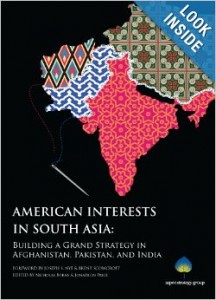
Nicholas Burns (Editor) , Jonathon Price (Editor) , Joseph S. Nye Jr. (Foreword) , Brent Scowcroft (Foreword)
3.0 out of 5 stars Parallel Universe — Divorced from Reality, September 20, 2013
I am in Afghanistan with the opportunity to think about all of the external and internal realities impacting on 2014, and this book attracted my immediately interest, along with Afghanistan: The Perfect Failure: A War Doomed By The Coalition's Strategies, Policies and Political Correctness. If I had the time I would buy and read both books, but sadly I have to focus on the here and now with just two comments:
01 All of these big names write great stuff, but I have to ask myself, who are they writing for? Who, if anyone is listening? Among all these great ideas, there is not a single one that has been implemented, funded, sustained, or effective. So why do we have smart people and think tanks? Are they a form of public entertainment, of public self-stroking, completely removed from the reality that the White House and Congress are so lacking in moral and intellectual fortitude as to be a constant danger to both the Republic and all other nations?
Continue reading “Review: American Interests in South Asia (Ho Ho Ho)”
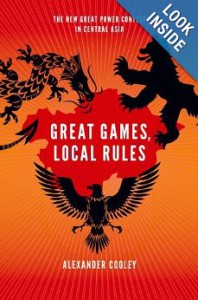
Alexander Cooley
3.0 out of 5 stars Neither the Book Nor the Other Reviews are Serious, September 16, 2013
I am in Afghanistan, where I spend my time thinking about all external and internal factors bearing on 2014, and I was greatly looking forward to reading this book. It arrived, I read it, and I am hugely disappointed. Judging by the long list of grants and stipends that the author names in the front of the book, I have to ask myself, how on earth did he ever arrive at such a sadly simplistic rendering of what is in essence the center of the world?
This book gets three stars from me because it fails across virtually every significant point of analysis — not that the facts are wrong — journeymen argue about facts, masters debate models and assumptions. I gave this book the benefit of my “first class” read, which is to say, I started with the index, the bibliography, and the notes. Here are reasons this book does not rise about the three star level:
01 No strategic model, no intelligence in the sense of decision support. Visit Phi Beta Iota the Public Intelligence Blog to learn everything that academics and think tanks have absolutely no clue about in relation to the evolving discipline of intelligence.
02 Afghanistan is a side show, not really included in the book in any substantive sense, nor is the author at all cognizant with the major tribes that bleed over the borders, the key personalities, etcetera. This is an anticeptic book that could easily have been written from an air-conditioned cubicle in the USA.
03 India gets 10 mentions, Iran 6, Pakistan 13, Turkey 5, and Saudi Arabia 3. Granted, the author is focusing his article in a hard cover (I have written longer monographs) on Russia, China, and the USA in relation to the ‘stans less Afghanistan — but this alone is grounds for disqualifying the book from any serious collection. The book is largely devoid of historical knowledge of the great game, and it is laughably empty when it comes to itemizing and explaining the local rules.
Continue reading “Review: Great Games, Local Rules: The New Great Power Contest in Central Asia”